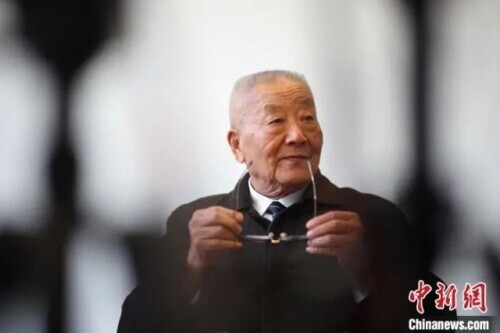The Nanjing Massacre committed by the Invading Japanese Army in 1937 is a dark page in human history. 84 years have passed, the historical truth will not be covered up by time, and mankind's belief and adherence to peace is like a fire through time and space, across regions and passed down from generation to generation. No matter where they are in the world, no matter what age they are, they turn the belief in transmitting the flame of peace into action, and they turn the hope of maintaining peace into a watchman, and they are the watchmen of peace through time and space.
Psychologically speaking, people seek advantage and avoid harm. As the dust settles, it is a normal reaction of many people to choose to avoid things that cause significant physical and mental harm. But there is such a group of elderly people who have experienced the war, and they have repeatedly talked about the pain of their families in the war, and their strong expectations for peace exceed everything. These old people are the survivors of the Nanjing Massacre.
"I'm old, but as long as I can move, I must stand up and tell this history." If Japan does not recognize the Nanjing Massacre one day, I will tell my own personal experience to young people over and over again. A few days ago, Ge Daorong, a survivor of the Nanjing Massacre, said in an interview with reporters at the Memorial Hall of the Compatriots Killed in the Nanjing Massacre of the Japanese Army Invading China.

Ge Daorong, a survivor of the Nanjing Massacre, recalled the past: "The war is miserable, and only when there is a country can there be a happy home." Photo by Yang Bo
Ge Daorong, who was born in 1927, is now in his nineties and has a full house of children and grandchildren. On December 13, 1937, the Japanese army invaded China and brutally invaded Nanjing, causing the tragic Nanjing Massacre. When he was still a 10-year-old boy, his uncle and two uncles were brutally killed by the Invading Japanese Army in the Nanjing Massacre, and his right leg was stabbed with bayonets by Japanese soldiers, leaving a permanent scar.
"The names of the three relatives who were killed in my family are engraved on the 'Wailing Wall' (the wall of the list of victims of the Nanjing Massacre in the Memorial Hall of the Nanjing Massacre of the Japanese Army invading China)." Whenever he thinks of this past, the old man Ge Daorong's mood is difficult to calm down.
A few days ago, Ge Daorong, a survivor of the Nanjing Massacre, said in an interview with reporters: "I want to tell my personal experience to young people over and over again. "Yang Bo photography
The old man recalled that in 1937, his family lived in No. 22, Butler Bridge, Xinjiekou, Nanjing. After the Japanese army invaded Nanjing, his uncle Ge Zhiyao was killed by 3 Japanese soldiers at the No. 2 Gaojia Tavern on Huaqiao Road, all of whom were unrecognizable; his uncle Pan Zhaoxiang took his luggage to Shimonoseki and was killed by the Japanese soldiers who besieged the city; his uncle Wang Junsheng was killed by the invading Japanese troops on the coal port construction site, and the bones are difficult to find.
"My uncle was going to Shimonoseki (Nanjing) to buy miscellaneous grains, and on the way back, the city gate was closed, and as a result, he was slaughtered by Japanese soldiers in Shimonoseki. I was 10 years old at the time, and I went to look for the corpse with my mother, and I saw that the ground was full of corpses, men, women and children, horizontal and vertical. The mother cried and shouted, 'Brother, where are you...'" the old man recalled.
Since then, Ge Daorong's family has been devastated. His father died early, and his mother brought needles and threads to mend the driver's shoes and clothes to "sew the poor" (in the old days, poor women sewed clothes on behalf of others to make a living), and starvation was commonplace. After his uncle was killed, his aunt was seriously ill and skinny, and there was no labor left in the family, leaving two children, and life was hungry and cold.
"The current situation of my family's life did not completely change until after the founding of New China, and later I got married and had children and started a family." The old man said.
The old man told reporters that he often said to his 4 sons: "The war is miserable, and only when there is a country can there be a happy family." To this end, he has been writing and producing special "heirlooms" for many years: the records of the events he personally experienced in the Nanjing Massacre, and the historical materials he collected and sorted over the decades about the Nanjing Massacre. He said that he had no property left to his descendants, and this "heirloom" would be passed down from generation to generation in the Ge family.
He also practiced what he preached, insisting on participating in various testimonial activities and telling more people about this painful family memory.
"China is no longer the China of the past, Chinese stand up, get rich, and become strong." National rejuvenation and a strong country depend on young people in the future. The old man said that he hopes that everyone will learn from history, and young people will study and work hard to build a stronger country and protect the precious peace.
Source: China News Service